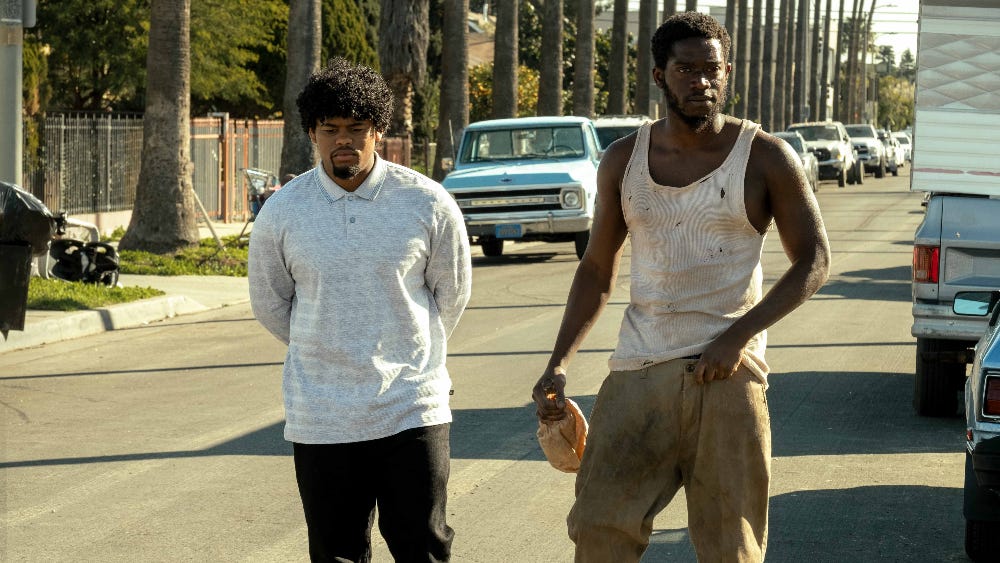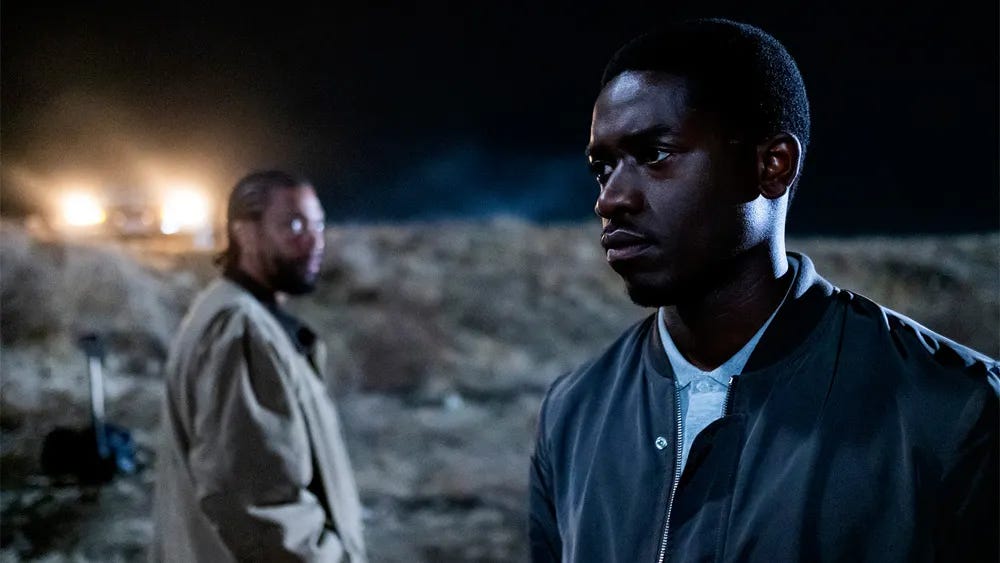Unraveling the Tragic Downfall of Franklin Saint
Dissecting the Emotional Trauma of a Kingpin's Fall from Grace
"Snowfall" serves as my unconventional solace, an unexpected sanctuary in an ocean of television programming. Typically, we envision comfort shows as narratives that cuddle our spirits, elicit carefree laughter, and weave uncomplicated tales. So, why has a potent portrayal of a young man’s distressing journey from a college dreamer to a notorious drug lord in the violent panorama of 1980s South Central captured my undying attention?
The credit rests with the late genius, John Singleton and his team. The expert storytelling, augmented by stunning visuals and a bomb soundtrack that resonates deep within the soul, transformed "Snowfall" into an emotional rollercoaster ride.
The group chat, where we once dissected every episode in feverish detail each week, now serves as a virtual living room where we continue to exchange cherished lines, relive captivating scenes, and share a nostalgia that keeps the spirit of the show alive. A time capsule if you will.
The complex evolution of Franklin Saint, masterfully brought to life by the charismatic Damson Idris, has ensnared viewers across the globe. We journeyed alongside Franklin as he shed the skin of a young, naive college dropout and morphed into a ruthless drug lord, who pushed "bidness" to the forefront, eclipsing his once beloved mother. From the modest confines of his childhood home to the dizzying grandeur of penthouse living, private aviation, and real estate empire, we shadowed Franklin's meteoric rise and his dramatic personal transformation.
So, when the series finale unveiled itself, viewers were left staggering at its stark conclusion.
Franklin Saint, the cunning architect of a criminal empire, was reduced to gratefully scrambling for a mere $20 from his childhood best friend Leon. The once elegant businessman, recognized for his polished suits, now wore a cloak of destitution, teetering on the brink of losing his mother's home due to unpaid property taxes. He looked like everything he’d been through, down to the bloodshot eyes.
The fall of Franklin was an emotional plummet.
The finale sparked a turbulent sea of reactions among viewers. Some wept, others boiled with anger, and a group of viewers resolved never to revisit the finale, opting to freeze their memory of Franklin at his pinnacle. Some, however, felt justice had prevailed.
TV and movies often wrap up stories neatly, gifting us the comfort of a happy ending.
But Franklin's story strayed from this predictable path.
Perhaps that’s what made the ending hit like a ton of bricks: life doesn’t always hand us a happy ending.
Franklin’s journey transcended the screen, influencing our everyday dialogues and thoughts. Each twist, each gut-wrenching decision, thrust us into contemplation about our own moral compass, our own human fragility.
We watched Franklin grapple with his own complex demons - the tension between loyalty and survival, the clash between love and the intoxicating allure of power. He lost dear friends (killed some), faced staggering losses, and ultimately found himself stripped of all he held dear - the love of his family, his burgeoning business, his wealth, and even the house he cherished as a symbol of his love for his mother.
In the grand scheme of Franklin's downfall, we're tempted to point fingers at Teddy, the peculiar CIA operative feeding Franklin with the poison to flood his own community. Teddy, who coolly drained Franklin's bank account of his life savings the moment Franklin attempted to extricate himself from the dark vortex of drug trafficking. This devastating theft sent Franklin spiraling, his world thrown into chaos as he scrambled to reclaim his stolen wealth. The reality of losing tens of millions of dollars was too surreal, too biting for Franklin to process, and he found himself ready to descend any depths to reclaim it.
Yet, as we shadowed his desperate pursuit in the final season, we found Franklin stripped bare, robbed of everything. The relentless chase, the unthinkable sacrifices, all culminated in a harsh reality - Franklin was left standing in the ruins of his empire, grappling with the bitter void of loss. He was left in the cold, clutching at the icy shards of his dreams that had crumbled to dust in his hands.
We want to blame his Mother.
If only Cissy hadn't pulled the trigger on Teddy, just as he was allegedly on the brink of wiring the stolen fortune back to Franklin. Had that shot not echoed in the stark silence, Franklin would have seen the return of his hard-earned wealth and possibly restored his equilibrium.
Yet, painting Cissy as the villainess in Franklin's downfall story is, at best, a skewed perspective. This narrative conveniently overlooks the broader panorama of Franklin's convoluted journey. His choices, his ambition, the tantalizing pull of power and wealth that led him down a path of self-destruction - these elements share equal responsibility in sculpting his tragic fate.
After all, it was not Cissy who lured Franklin into the perilous world of drug trafficking, nor was it she who nurtured his ambition into a blinding obsession. The gunshot that echoed in that moment was a manifestation of a mother's desperation, not the solitary cause of Franklin's undoing.
And, while it’s convenient to thrust all blame on someone else, to wrap up Franklin's tragedy as the byproduct of someone else’s choices, it's a gross oversimplification of Franklin's complex narrative. It's Franklin's choices, his relentless ambition, and the seductive lure of power that entwined him in this dance of destruction. His downfall, as heartbreaking as it is, is as much a product of his decisions as it is the result of Teddy's manipulations. In the end, Franklin was left hollowed out, a casualty of his own ambitions, standing alone in the echo of his fall from grace.
Isn't it easier to point the finger when our dreams get sidetracked? Oh, how we dance around taking ownership for our current spot on life's journey. When contentment eludes us, too often, it's just so tempting to pass the baton of blame. After all, looking inward? That requires a certain kind of bravery, emotional maturity and self awareness.
In the hushed whispers of TV show comments, there's a sentiment I've often stumbled upon: Franklin should've met his demise by the end. But in the rhythm of life's rich complexities, I find myself swaying to a different tune.
Death, some argue, would have been the poetic end to Franklin's saga. But isn't there a peculiar kind of agony in enduring the long days, bearing the weight of one's choices, and navigating the intricate maze of consequences? We, the romantics, crave conclusions that reassure and uplift, but life isn’t always narrated by fairy tales.
Every episode, as I cheered for Franklin, hoping for a resolution, it dawned on me that what I was witnessing was his dance with karma. A reminder that after sowing the whirlwind, one doesn't simply waltz into a serene sunset with a story neatly tied up in ribbons.
The curtain fall on 'Snowfall' was steeped in veracity.
Life's script doesn't always play out as hoped, especially in an era drenched in toxic positivity. Sometimes, the most poignant stories are those that mirror the uncertainties and unmet hopes of our own lives.
In the unfolding saga of Franklin's journey, I glimpsed a reflection of the idols we unknowingly worship in the temples of our souls. For him, the twin deities of money and power held dominion. Stripped of them, he spiraled, metamorphosing into a darker version of himself, a man consumed by a desperate thirst to reclaim what he'd lost, regardless of the path taken.
As the credits rolled on the season finale, I found myself wading through the reservoir of emotions it stirred, reflecting on the puppeteers behind my own choices. Each decision, I realized, either propels us closer to our soul's true north or drifts us further astray. So, what fuels our paths? Often, it's the silent currents beneath our conscious mind, the undercurrents that shape our choices.
And I tell you no lies— as the episode's weight settled in my chest, my fingers flew to my phone, texting my therapist. The depths this narrative plunged me into demanded introspection, prompting questions that only introspective therapy could help navigate. What was fueling my own choices?
Perhaps the unease some felt while watching wasn't merely about the storyline's trajectory. Could it be the discomfort of gazing into a mirror too unflinchingly, catching a reflection of those raw emotions we've artfully dodged? Maybe it's those dormant feelings, ones we're not quite prepared to dance with, that stirred the pot of discontent. To put it plainly: I think shit got too real.
This is precisely the caliber of storytelling that fuels my soul. I yearn to be moved—to laugh, to cry, to feel the flutter of rage or passion within. I'm not merely seeking an escape when I lose myself in a book or show; I desire the alchemy of emotion. Slice through my heart, and I'll still beg for more! And let me tell you, "Snowfall" did just that. Six seasons of an emotional odyssey? Now, that is art in its purest form.
I'm left wondering: What are the narratives in our lives that we shy away from? Which stories or characters unearth feelings that we've been skirting around? How did the “Snowfall” series finale make you feel? Here's my call to you— take a moment, reflect, and drop your thoughts in the comments. Let's dive deep together.








It was heartbreaking but not unexpected. With John Singleton gone I wasn’t sure what to expect the writers to do to end this saga. I love the acting. I love the storyline, but I can’t say I love the ending. Because a part of me wanted Franklin Saint to win, not end up like a version of his father.